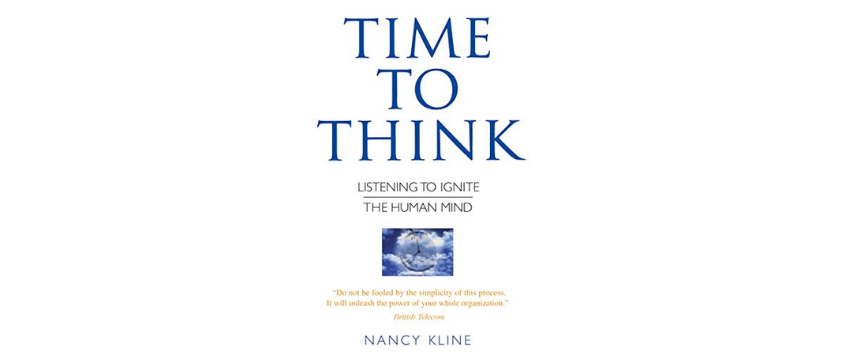
Creating Time to Think – Paying Attention to Help Others
Thinking for yourself is the thing on which everything else depends.
Nancy Kline, Time to Think: Listening to Ignite the Human Mind (1999)
How wonderful is it when someone pays attention to you with fascination, curiosity and intrigue? What happens when someone gives you the space and time to think?
Attention is listening with respect, interest and fascination.
Nancy Kline
Developing listening skills and paying attention is at the heart of all good conversations. When this happens to us we become more curious about the depths of our thinking and are encouraged to go further. For me this means I discover new perspectives, understand my feelings and have fresh ideas.
I thought I was doing well at listening and creating space for people to think until I first read Time to Think in 2001. I soon saw that I wasn’t very good at all! After reading Time to Think I was intrigued and went on to train with Nancy Kline in the principles of the Thinking Environment.
Her training and this book has deeply impacted the way I coach, listen, and pay attention to others in all aspects of my life. From paying attention to my 4-year old niece to paying attention to a senior executive coaching client. She taught me how to develop my listening skills.
The principles I learnt slip into all aspects of my coaching and our accredited coach training programmes. I learnt to try not to interrupt and this was my first journey into believing my client’s are resourceful and whole and can think for themselves. They don’t need me to tell them what to do!
Even 20 years after first reading Time to Think I often recommend it. This is a book that continues to stand the test of time, coming more and more into its own.
Why read Time to Think?
Time to Think is one of our 4 recommended reading texts for our ACC Level 1 coach training programme. Students regularly reference this book as impacting their approach to coaching and life – helping their ability to listen with rapt attention to their clients, family and friends.
But this book isn’t just for coaches. Parents, partners, teachers, leaders and students can all learn meaningful life skills by exploring the concepts of a thinking environment.
At the heart of the book is the idea that –
The quality of your attention determines the quality of other people’s thinking.
Nancy Kline
Her idea is that if I give you my full attention you will think better. In fact, Kline was ahead of the research. This was her own observation, and in recent years neuroscience has suggested that she is right.
What does neuroscience tell us about listening?
When we are tense and stressed (caught in our sympathetic nervous system) we find it hard to think clearly. We are caught up in emotional triggers and our bodies are flooded with unhelpful chemicals. When we are calm (in the parasympathetic nervous system) we are better able to think clearly.
Research shows that when I am calm, thanks to mirror neurons, it helps the person I am with to be calm too. When I am having a conversation with someone, when I am helping them think, I can help them to relax into their parasympathetic nervous system and therefore think more clearly!
On top of this when I hold the belief that you are resourceful and whole and able to dig deep into your own wisdom – I help you also hold this belief
My coaching supervisor talks about this concept as ‘withness’ – the idea of being so fully present with another person that you are in flow with them and they are able to think for themselves.
Time and again I see this as a coach – when I really pay attention to someone and give them space to think, they come up with their own solutions to problems – sometimes solutions they didn’t know they had.
I believe this book is about that.
10 Components of a Thinking Environment
In the book, Nancy introduces the 10 components of a Thinking Environment. She believes these help to create the conditions for good thinking partnerships (or coaching conversations). These are a list of ‘how to…’ She brings them to life with examples and practical ways to apply the 10 components in work and life.
The 10 components are Attention, Incisive Questions, Equality, Appreciation, Ease, Encouragement, Feelings, Information (sometimes), Place and Diversity.
Perhaps the most important of these is Attention.
How could you offer someone your full attention today?
Good Self-Coaching Questions
These coaching questions can be used for self reflection, journalling or in peer coaching conversations.
- How good is my attention (listening with respect, interest and fascination) on a scale of 1 – 10? What can I do to increase my score?
- How often do I interrupt people? What could I do to reduce this?
- Who helps me with my thinking? What do they do to help this?
- When I am in conversation with others do I give them space to think?
You can learn more about how to pay good attention on our ACC Level 1 Coaching Programme.
About the Author
Jean Balfour is Managing Director of Bailey Balfour and Programme Director of our ICF Accredited Coach Training Programmes. Jean is passionate about helping people to have good conversations both at work and at home. She believes that coaching is a life skill and that you never regret learning to coach.


